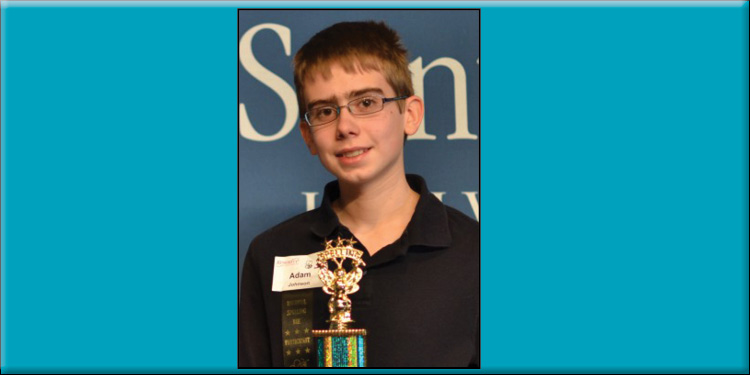by Dennis Dalman
news@thenewsleaders.com
Adam Johnson has a veritable instinct for spelling, so much so that he can spell words correctly he’s never heard of before or of which he is only vaguely familiar — words such as “kudzu” and “chutney.”
Although Johnson did not win or place in the state competition a few days later, his win in the regional contest is considered a triumph by all who know him. The state winner is Emma Greenlee from Mesaba East (Aurora).
It was the word “schnauzer” that propelled Johnson into one his first-place win Feb. 1 at the Region 5 Spelling Bee championship competition at St. John’s University. Johnson, an eighth-grader at Sartell Middle School, won the morning session. Ali Ophoven, a homeschooled eighth-grade girl from St. Joseph, placed second in that event. Both advanced to the multi-regional state competition, which took place Feb. 26 in Fergus Falls. There were two other Sartell Middle School students who competed in the morning session at SJU — Maia Kurvers and Monte Belmont, both seventh-graders.
In the afternoon session at SJU, the first-place winner was Madison Daniels of the Watertown-Mayer School District (in Watertown); the runner-up was Morgan Tasler of East Central Schools (in Banning). They, too, participated in the multi-regionals in Fergus Falls.
The reason there are two spelling-bee sessions, morning and afternoon, is because of the high number of students who compete in the competition.
“It was fun,” Johnson said of the SJU spelling bee event. “Toward the end I was a bit nervous. Most of the words I knew the meanings of and how to spell them. I wasn’t sure about chutney and kudzu. I never heard of kudzu before.”
Kudzu is a fast-growing vine common in the American South and in Asia. Chutney is a sweet-and-sour relish that originated in India.
One reason Johnson was quite comfortable with the spelling bee is that he participated in the regional bee last year and the year before. Last year he placed third.
Another reason Johnson is comfortable in spelling bees is that he loves words and is obviously good at spelling them, which produces a lot of self-confidence.
“I love to read,” he said, a hobby that naturally exposes him to lots and lots of words, including the kinds of difficult words often asked in spelling bees. “Most of all, I like science. I like to read about science subjects.”
In the morning session at SJU, 24 contestants went through 15 rounds and 130 words spelled. In the afternoon session, there were 27 competitors, 16 rounds and 145 words spelled.
Johnson’s family members were in the audience at both competitions — regional and state. They included his parents, Pete and Janelle; and his siblings — Julia, 9; and Wesley, 7. Needless to say, the family was in suspense, hanging on every word.
“It was a bit nerve-wracking,” his mother said.
There are eight statewide regions that participate in the regional and the multi-regional spelling bees every year. Sartell is in Region 5. In each reason, the sponsors for the spelling bees are educational service cooperatives. Region 5 is sponsored by Resource Training and Solutions and coordinated by RTS’s Director of Educational Programs, Sandra Cordie of Sartell. Other schools that competed from Region 5 at the regional and/or state levels are Big Lake, Dassel-Cokato, Kimball, Maple Lake, Melrose, Rockford, Sauk Rapids-Rice, St. Cloud, STRIDE Academy and Belgrade-Brooten-Elrosa.
Fun Facts
In 1925, nine newspapers collaborated to start the National Spelling Bee. There were no bees during the years of World War II. Since the “Scripps National Spelling Bee” began, there have been 87 grand champions 46 girls, 41 boys.
The first winner, in 1925, was Frank Neuhauser of Louisville, Ken., who became champ after spelling correctly a flower named “gladiolus,” which, as luck would have it, Neuhauser knew well since his parents grew the flowers in his back yard. Neuhauser, 11 at the time, won $500 in gold pieces, a bicycle and a meeting with President Calvin Coolidge. After a battle with blood disease, Neuhauser died in 2011 at the age of 97.
Throughout his life, he was often a honorary guest at many of the national spelling bees.
Strangely enough, word scholars have disagreed about the origin of the word “spelling bee.” The word can mean a social gathering in which people get together for a single activity, such as quilting, barn-raising, sewing or spinning. That usage stems back to 1769 in the United States.
Some have argued spelling “bee” comes from the world of bees, who gather in the hives for honey-making.
Most scholars reject the insect origin, however. Most recently, philologists believe “bee” is a shortening of the word “been” or “bean,” which is an English dialect form of the older, Middle English word “bene.” That word meant “prayer or favor.” Later, the dialect form of “bene” came to mean a voluntary gathering of neighbors to accomplish a specific task. Thus, bee may be a shortened form of “been” or “bean,” but so far that connection has not been proven.
The following are some of the winning words in the Scripps National Spelling Bee:
1940: therapy
1950: haruspex
1960: troche
1970: croissant
1980: elucubrate
1990: fibranne
2000: demarche
2005: appoggiatura.
2006: ursprache
2007: serrefine
2008: guerdon
2009: laodicean
2010: stromuhr
2011: cymotrichous
National Bee starts May 26 in Wash. D.C.




